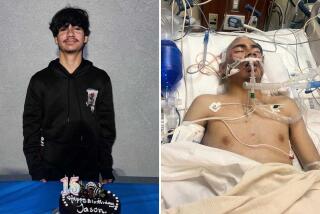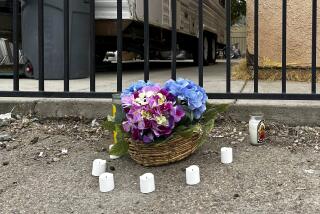Retrial Begins for 3 Accused in Slaying at Party
- Share via
It was supposed to have been a happy, festive event--Jason Shaw merely wanted to throw a birthday bash at his house in honor of a friend.
But the youthful revelry, replete with booze and drugs, exploded into tragedy. The 20-year-old Woodland Hills man got into a brawl with some party-crashers and died after he was stabbed in the heart and lung.
Three of the teenagers accused of Shaw’s 1997 killing were found guilty of murder, and two were given life sentences. Now Michael Baker, Christopher Bryan Paonessa and Dino Ferrari Riggio are back in court because of faulty jury instructions given during their first trial.
“This particular case is a particularly sad one,” Deputy Dist. Atty. Lea Purwin D’Agostino said Wednesday during opening statements in the retrial, describing the trauma to Shaw’s family as well as the many teenage party-goers who saw the video store clerk bleed to death.
Defense attorneys contend the three young men from Chatsworth, who were teenagers at the time, did not intend to kill anyone, that eyewitnesses were unreliable, and that Baker--who wielded a knife--had acted in self-defense because Shaw was the aggressor.
The three defendants, hair neatly combed and wearing button-down long-sleeve shirts, presented a conservative, clean-cut image in court Wednesday that was dramatically different from the defiant-looking teens with shaved heads in the police photos displayed for jurors to see.
In 1997, Baker and Paonessa were convicted of first-degree murder and sentenced to two life terms. Riggio, who was convicted of second-degree murder, received 15 years to life. At the time of the stabbing, Baker was 19, and Paonessa and Riggio were 18.
Baker, now 22, and Paonessa and Riggio, both now 21, are each charged with murder, conspiracy to commit assault and burglary. Baker and Paonessa are also charged with the attempted murder of Daniel Parkison, a friend of Shaw’s who was stabbed six times, and Riggio is charged with assault.
The trouble on the night of March 1, 1997 began when Baker tried to enter the party but refused to pay the cash admission at the door, D’Agostino said, and later he was beaten up and thrown out because of an argument with Shaw over laughing gas, which some party-goers had been sniffing.
Vowing revenge, Baker returned to Shaw’s house a couple of hours later with Paonessa, Riggio and eight other youths and burst inside, D’Agostino said. After he was confronted in his own bedroom, Shaw swung at Baker with a bat but missed and was stabbed twice. He staggered into his backyard and died.
In his opening statement, Baker’s attorney, Bradley Brunon, said that the youths had no intent to kill and that Shaw had been high on cocaine.
“He was, according to his own friends, aggressive, hyper . . . he was wired,” Brunon said of Shaw. Holding up a small wooden baseball bat that Shaw had swung at Baker, Brunon said: “I want you to imagine what doing this can do to someone’s head.”
Had Shaw’s blow not been deflected by a fan, it might be Shaw--not Baker--who is now sitting at the defendants’ table, Brunon said, adding that Baker held out a knife in self-defense.
Morton Philip Borenstein, the attorney for Paonessa, told jurors that prosecution witnesses are unreliable because they had been drinking alcohol, smoking marijuana and sniffing laughing gas, and they may be confused over what they saw during the melee.
Attorney Jonathan Mandel said there was insufficient evidence to show that his client, Riggio, who drove Baker and Paonessa to the house, knew that others had weapons or that he was in Shaw’s bedroom when the stabbing occurred.
As the attorneys spoke, Shaw’s mother, grandmothers and two aunts silently wept in the courtroom. Family members of the defendants were also present. Both sides declined comment.
Last year, the state Court of Appeal found that Los Angeles Superior Court Judge L. Jeffrey Wiatt had erred in his jury instructions, including his refusal to give jurors the options of voluntary manslaughter and self-defense.
The other eight youths involved in the case included several juveniles who either pleaded guilty or were convicted by a jury of charges ranging from burglary to conspiracy, D’Agostino said.
Those defendants did not face charges as serious as those facing Baker, Paonessa and Riggio, who are the primary defendants because they were all allegedly in Shaw’s bedroom during the stabbing, while others remained outside.
More to Read
Sign up for Essential California
The most important California stories and recommendations in your inbox every morning.
You may occasionally receive promotional content from the Los Angeles Times.













